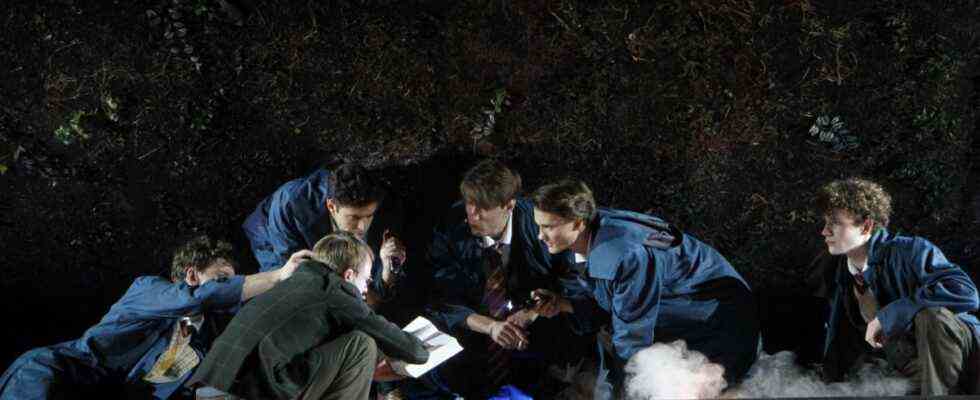When the rain comes, it’s time for summer theater. No peasant rule, old theater law. The audience at the Bad Hersfeld Festival know that, of course, and at 13 degrees they are appropriately equipped with winter coats and blankets, it gets really cold
It has been 70 years since the Austrian Johannes Klein took over as director of the Bad Hersfeld Festival, which was founded on the model of the Salzburg Festival. It quickly became the state’s summer theater, almost as exciting as Salzburg, they played “Jedermann”, clapped from 1966, and before that they had to remain silent in the ruins of the church. Götz George, Will Quadflieg, Erika Pluhar, Witta Pohl, Theo Lingen played, Bad Hersfeld basked in their splendor. In the eighties things went downhill, quick changes of directors, until Dieter Wedel came in 2015 and left again in 2018 because of allegations of rape and sexual assault.
At that time, his assistant Joern Hinkel lobbied courageously, in 2020 the 70th birthday should be celebrated, but for known reasons it had to be postponed to 2021. Four new productions are now on the schedule until August 8th: “Momo”, the musical “Goethe!”, The comedy “Extrawurst”, and for the opening “The Club of Dead Poets”.
When The Dead Poets Club hit theaters in 1989, everyone wanted a teacher like John Keating, who could speak of “O Captain! My Captain!” was worthy. And even if it doesn’t seem like it: the material has never been played on a European stage. Festival director Joern Hinkel and his team had to spend a long time on the phone before they landed with screenwriter Tom Schulman. He was convinced, but wanted to work on a version.
That explains why Hinkel based his staging so closely on the film, had to lean on it. This is nice for those who adore the film, but also not very original for those who like to see their own ideas from artists on stage. The magic of the story, however, lies in its romantic, undisguised pathos, and Hinkel brings that onto the stage just as true to the original.
Naturalistically, he traces the story of the students who are encouraged to think and feel for themselves by the unconventional teacher John Keating. The authoritarian mustache of an elite boarding school in the late 1950s, giggling girls in cheerleading uniforms, fathers who the war made tough and who want to shape their sons into something they are no longer themselves. Hormones and secret smoking, the madness of first love. Hinkel has some great young actors with him, Nico Ramon Kleemann, 19, screams as the introverted Todd Anderson (in the film it was Ethan Hawke) with a “barbaric yawp”, quote Walt Whitman, Till Timmermann plays a Neil who is glowing with passion Perry. The charismatic teacher John Keating is certainly the hardest to cast, Robin Williams was too impressive in the role at the time. Götz Schubert, as a long slag, more intellectual than the cuddly Williams, definitely has captain potential, but tries again and again to imitate Williams’ exact tone from the film. He didn’t need to.
At first the ensemble seems a bit inhibited, as if it was playing at 80 percent, as if in worry about slipping. Possibly justified, because the drizzle continues, the stage floor is soaking wet. Exuberance does not turn out right. The production becomes thick and oppressive when the conflict between Neil and his father comes to a head. He thinks his son’s acting plans are monkey, but Neil plays anyway – and shoots himself out of desperation.
Authoritarian fathers and boarding schools who babble about “tradition, honor, discipline and excellence” may seem a bit old-fashioned, even if they still exist in a new form. Hinkel’s decision to opt for the original, not to transfer anything to the present, is correct. Because the topic is too good: The most inspiring people (teachers or not) are still those who dare to leave the path of thought and, beware of kitsch, show you the beauty of life. Keating rightly believes that romanticism does not have to contradict an enlightened spirit of the natural sciences. On the contrary, it can add a sensual level to it, accept its nuances and ambiguities as such and enjoy them.
“The Dead Poets’ Club” is perhaps right now a piece for the tired youth, because it calls on us to soak up all that life has to offer and to look for our own place in a society that is slumbering in conformism. “O Captain! My Captain!” At the end of the day, the students salute their fired teacher Keating, stepping onto the desks, everyone has been waiting for that.

